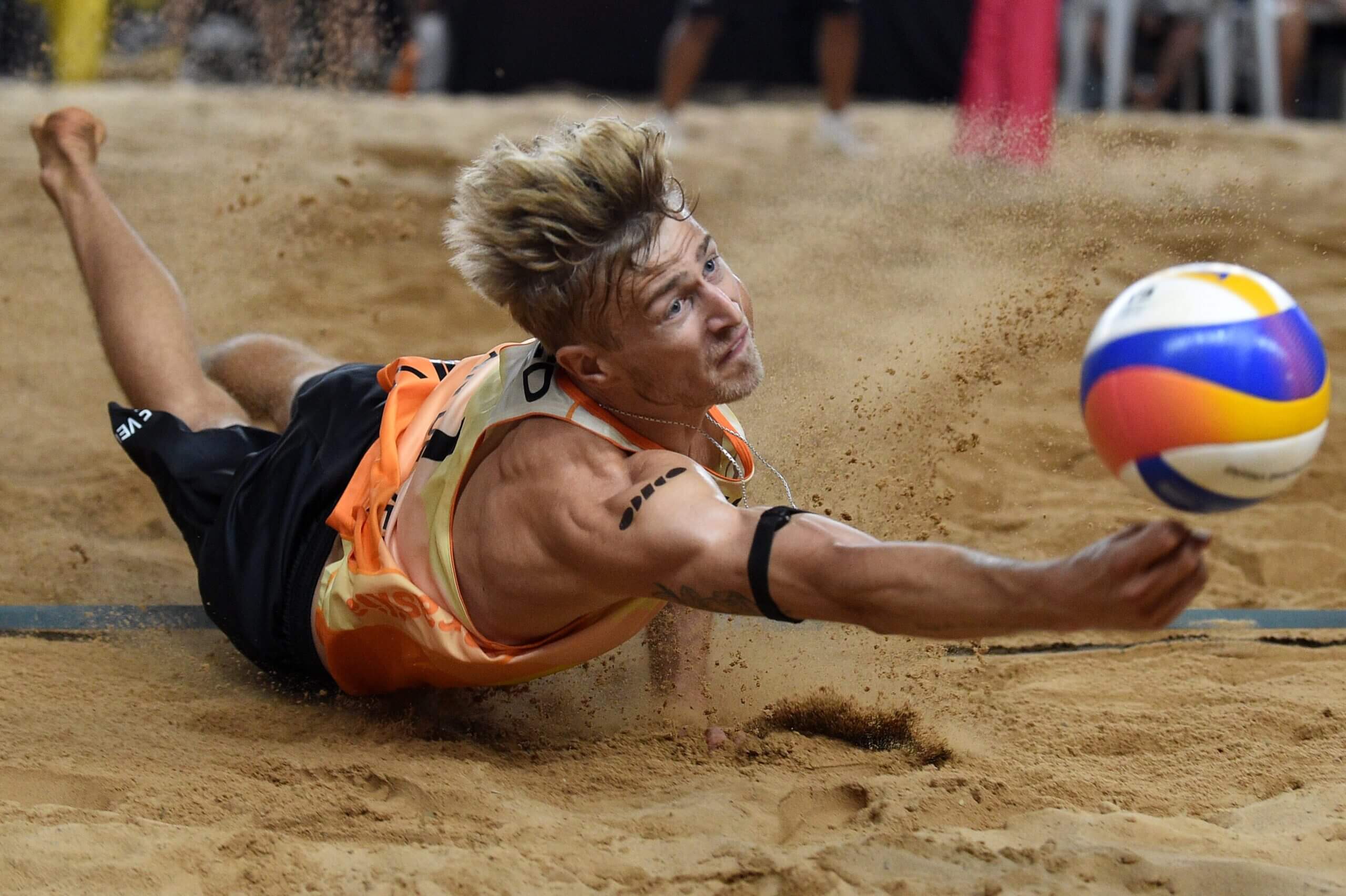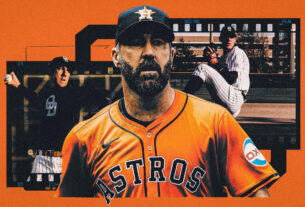Steven van de Velde will step into a picturesque sand court near the base of the Eiffel Tower on Sunday to meet his long-held ambition of becoming an Olympian.
And to let him represent the Netherlands at the Paris Games, the Dutch Olympic Committee agreed that he should stay outside the athletes’ village and not talk with media, who would certainly ask about his prison sentence for raping a 12-year-old girl when he was 19.
Van de Velde, 29, has been competing on the volleyball tour and in international competitions for several years, yet his selection to the Dutch Olympic team has prompted backlash and new attention to his troubling past.
The Dutch Olympic Committee and Dutch Volleyball Federation declined to make Van de Velde available and to comment to The Athletic beyond a statement that said in part that Van de Velde was included on the team “after careful consideration” and that he had “consistently met” their high standards. Van de Velde, approached as he arrived in Paris this week by a reporter from the Daily Mail, declined comment beyond the statements from the federation and committee.
Van de Velde was sentenced to four years in prison in 2016 after admitting that he had taken a cheap flight from Amsterdam to a small airport north of London in 2014 and had sex with a 12-year-old girl after they had talked online frequently for several months.
He was caught after he advised his victim to get a morning-after pill. Staff at a family planning clinic alerted the girl’s family and the police because of her age.

(Pablo Morano/BSR Agency/Getty Images)
Van de Velde served 13 months in prison, including 12 months in Britain before he was transferred to the Netherlands under a treaty between the countries. He was resentenced to a shorter term under Dutch law and was released in early 2017.
After coming out of jail, he gave an interview to Dutch newspaper Algemeen Dagblad in which he said: “I have been branded as a sex monster, as a paedophile. That I am not — really not.”
Van de Velde’s name is still on the UK’s sex offenders registry. Aylesbury Crown Court heard how he started talking to the girl on social media — on Skype, Facebook and Snapchat — and spoke to her almost every day over a few months.
Their communication started when she sent him a friend request. He initially thought she was 16 but even when she told him her real age, he did not break off contact.
On August 2, 2014, he boarded a flight to meet his victim in person. From Luton airport, he took a taxi 22 miles (35km) to Milton Keynes, the town where she lived, for their sexual encounters, including one instance of vaginal sex during which she complained he was hurting her. They also drank Baileys Irish Cream Liqueur together and slept on a cardboard box under a hotel stairway when they couldn’t get a room.
Before he returned to the Netherlands, Van de Velde advised his victim to get the morning-after pill because they had not used contraception.
Back in his home country, Van de Velde’s sporting career was taking off.
He had just won a national championship in 2015 and looked set to make the Dutch team for the following summer’s Olympics in Rio de Janeiro. Then a European warrant was issued for his arrest on child sex charges.
He was extradited to the UK on January 8, 2016, where he pleaded guilty to three counts of raping a child.
In court, his lawyer Linda Strudwick argued that Van de Velde was not a “predatory young man” and that flying to the UK to meet the girl had been a “spur-of-the-moment decision”. She claimed his actions were not grooming and that he did not make the journey “for the purpose of having sex”.
She said: “There was mutual support as two angst-ridden juveniles. He’s lost a stellar sporting career and he’s being branded a rapist. In Holland, the term means violent sexual assault without consent. The headlines say it all — ‘a sex monster.’ It’s plainly a career end for him.”
When Van de Velde was sentenced, it was revealed in court that the victim felt racked with guilt following his arrest and had been self-harming. Judge Francis Sheridan told Van de Velde: “The emotional harm that has been caused to this child is enormous. As she matures, she will have to come to realise that you are not the nice man she thought you were and hoped you might be.”
Under UK law, victims of sexual offences are granted lifelong anonymity, both during the legal process and beyond.

These Olympics will be the peak of Van de Velde’s career (Buda Mendes/Getty Images)
The sentence was reduced in the Netherlands because its law relating to sex with minors is less strict than the law in England.
In a TV interview one year after his release, Van de Velde attributed his crime to being a teenager and “still figuring things out”.
“I made that choice in my life when I wasn’t ready,” he told NOS. “I was sort of lost and now I have so much more life experience.”
He added: “Everyone wants to be liked, everyone wants to be respected, and with something like this on your record, it’s difficult. I can’t reverse it, so I have to carry the consequences. It’s the biggest mistake of my life.”
Since then, he has rebuilt his life and sporting career. He has competed for his country on the international stage since 2017, and in 2022 he married Kim van de Velde, a German beach volleyball player who has also trained as a police officer. They have a two-year-old son.
Marking a career high, Van de Velde will appear at the Paris Olympics alongside his playing partner Matthew Immers, 23, and the pair will hope to build on their recent success where they were runners-up at a tournament on beach volleyball’s world tour in May. Van de Velde has also competed at multiple world and European championships.
Their first group-stage match in Paris is against an Italian duo on Sunday morning.
“I know the Steven of today and I’m happy about that,” Immers said. “I feel comfortable with him, we take good care of each other. I’m 23, he’s 29. He’s a kind of a second father to me, who supports me.”
In its statement, the Dutch Olympic Committee said Van de Velde deserved a second chance as he had shown that he’d “grown and positively changed his life”.
The statement said: “We are deeply aware that the renewed publicity about Steven van de Velde is causing a lot of emotion, which we fully understand, as the events at that time were very serious. A lot has happened since then. Steven served his sentence and has completed an extensive rehabilitation programme with specialised professionals, including the probation service. Experts have concluded there is no risk of recidivism.”
“He is proving to be an exemplary professional and human being and there has been no reason to doubt him since his return,” said Michel Everaert, general director of the Dutch Volleyball Federation.
The volleyball federation added that “when Van de Velde looks in the mirror now, he sees a mature and happy man, married and father of a beautiful son.”
Pieter van den Hoogenband, chef de mission for Dutch Olympic Committee, said the moves to change his accommodations and restrict him from the media were necessary because attention on Van de Velde had magnified around the Paris Games.
“He’s not going to downplay it. We have to respect that and help him as a member of the team to be able to perform,” Van den Hoogenband said.
The IOC does not have its own rules for the selection of individual participants for games, deferring to each national olympic committee to make its own decisions.
“They (the Dutch Olympic Committee) have put out a statement, they’ve made it very clear there’s a lot of safeguarding going on, special extra safeguarding,” IOC spokesman Mark Adams told a news conference in Paris on Saturday.
Some national Olympic officials have made it clear they would not have chosen an athlete to play under similar circumstances.
“If an athlete or a staff member had that conviction, they wouldn’t be allowed to be a member of our team,” said Australia’s chef de mission, Anna Meares.
Van de Velde’s appearance at the Games has prompted fury from campaign groups who said he’d shown a “chilling” lack of remorse and empathy for his victim. A petition with nearly 81,000 signatures called on the IOC to ban known sex offenders from competing.
The Survivors Trust, a UK-based group which supports victims of sexual violence, said in a statement that his inclusion was a “further endorsement of the shocking toleration we have of child sexual abuse.” It added: “The rape of a child was planned, calculated involving international travel, and will undoubtedly cause his victim lifelong trauma, irreversibly changing the course of her life. As a society, we have to start embracing a zero-tolerance approach to this heinous and costly crime.”
“An athlete convicted of child sexual abuse, no matter in what country, should not be awarded the opportunity to compete in the Olympic Games,” added Julie Ann Rivers-Cochran, executive director of The Army of Survivors. “Despite Van de Velde’s justifications, there is no excuse for raping a child. Van de Velde’s statement reveals a lack of remorse and understanding of the consequences of his actions. Raping a minor is not a ‘misstep’ — it is a criminal violation that should exclude people from participation in the Olympic Games.”
When Van de Velde was sentenced in 2016, Judge Sheridan told him: “Your hopes of representing your country now lie as a shattered dream. Your actions in those two days in England have wrecked your life and you could, had you never come to England and committed these offences, have been a leader in your sport.”
Yet, eight years on, Van de Velde’s dreams are far from shattered.
(Top photo: Lucio Tavora/Xinhua via Getty Images)





